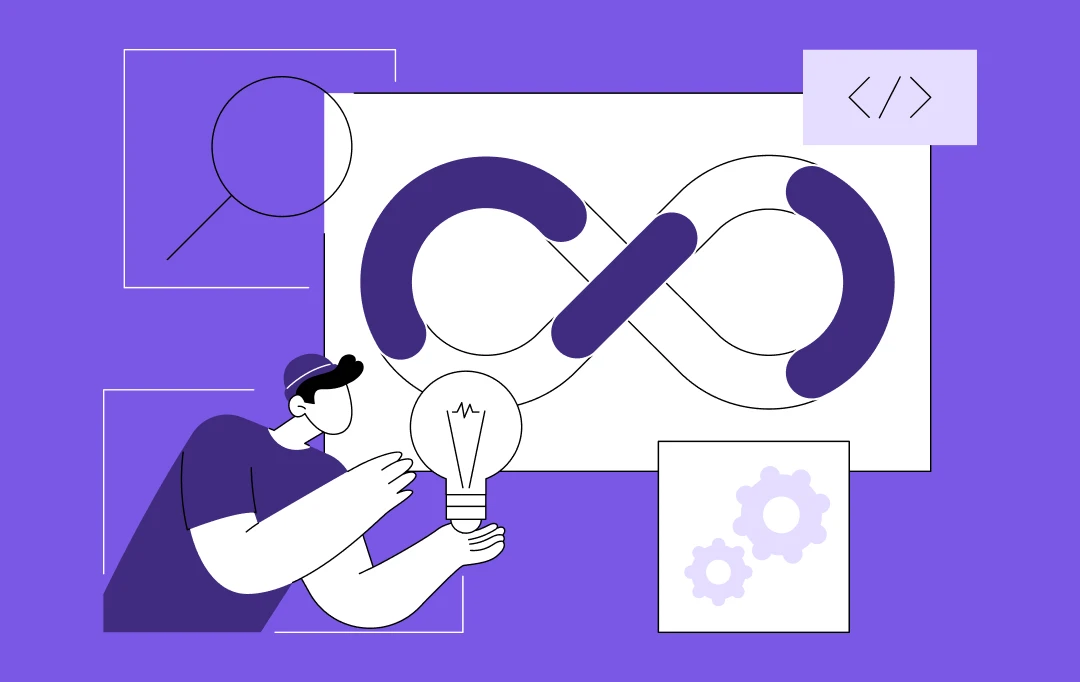- What is DevOps?
- What are the benefits of DevOps?
- Speedier response to market needs
- Better quality products released faster
- Better work environment
- The 7 principles of DevOps
- Customer focus
- Complete ownership
- Systems thinking
- Continuous improvement
- Automation
- Communication and collaboration
- Focus on results
- DevOps best practices
- How Appinventiv can help shift to DevOps model?
The software industry has, in the last decade, witnessed a momentous change in the development process. A significant sign of this change has been that the traditional form of building software is on the verge of going obsolete, especially due to factors like –
- Introduction of new technologies
- Changing market needs
- Competition from digital-first companies
- Greater focus on security
To meet this paradigm shift, the IT sector has been turning to the merger of Agile processes and DevOps.
DevOps has completely changed the way businesses build and deploy software, possibly forever. Now, irrespective of whether you have applied DevOps in your software development process or not, the approach is here to stay. So, the best thing that you can do as an IT entrepreneur is learn the principles of DevOps and get an in-depth understanding of the concept for the time when you would have to incorporate it.
In this article, we are going to know what DevOps tools are, the benefits of DevOps, what is the principle of DevOps, and the best practices. We hope that by the time you reach the end of the article, you will be in a space where it would be easy to implement the technology in your business.
What is DevOps?

DevOps is the approach of merging people, processes, and DevOps tools to create high-quality software speedily. The model combines the developers (Dev) and operations (Ops) teams into a single entity that manages the complete application lifecycle.
You might also want to explore the DevOpsification journey in Product Engineering.
DevOps also paves the way for automation, Continuous Integration, and Continuous Development in every element of the SDLC. At its core, DevOps provides the necessary toolset to build high-quality software with minimal errors.
Understanding what DevOps is lays the foundation for knowing what to expect from its incorporation. Let us look into it in the next section.
What are the benefits of DevOps?
The benefits of DevOps typically fall into three broad areas addressing issues of both internal and external users. Here is what to expect from your DevOps adoption.
Speedier response to market needs
In the present competitive digital space, businesses need to release products that the market needs. It is the only way to survive the competition. DevOps tools help businesses align themselves with what customers need and deliver the expectations rapidly. This, in turn, betters customer retention.
Better quality products released faster
The DevOps CI/CD approach leads to the fast release of high-quality applications that are free from glitches and bugs. Because of CI/CD, the errors are caught easily in the early development stages and not after the product reaches the market.
Better work environment
DevOps principles and practices lead to better communication, team collaboration, and internal cooperation while keeping everyone on the same page along the SDLC phases. This level of transparency in communication betters morale that leads to the growth of a productive and healthy work environment.
It is unquestionable that the benefits of DevOps are very expansive. However, applying them requires an understanding of DevOps practices and principles – something we are going to look at in the next section.
The 7 principles of DevOps
The success of a DevOps mindset lies in learning the best DevOps practices and principles.
Let us look into the 7 principles of DevOps that every IT team follows.

Customer focus
The goal of DevOps best practices is to build an environment that is innovative, agile, and responds quickly to changing market needs. To achieve this, you would have to review processes, data, and the market – much faster than your competitors.
This means you would have to create an organizational culture that is focused on meeting customers’ needs by reviewing performance and identifying processes that can be automated.
Complete ownership
The one team mindset that works behind the DevOps principles helps bring down barriers that exist between the operations and development teams. Complete ownership means that the wall doesn’t exist between teams, and the DevOps team as a whole is responsible for every stage of product development and the quality of the end deliverable.
Systems thinking
This is another one of the key principles of DevOps that calls for people to change their mindset around development and operations. Instead of working in silos, the approach helps teams see the bigger picture. This helps better the team productivity, ensures clear understanding of what needs to be fixed, lowers the response time, and betters the product efficiency.
Continuous improvement
Continuous betterment of the process and product is the next core DevOps principle. With the teams working together focusing on one goal and continuously improving, it becomes easy. This also helps the teams stay flexible at times of change, even when they are facing failures.
Automation
Automation is a big part of the DevOps model. It enables the processes to get streamlined, which lowers the time it takes for teams to respond to the market and fix issues. Through automation using DevOps tools, companies are able to release products to customers at a much speedier rate. The success of this principle, however, lies in your DevOps team identifying the process which can get automated and completed in a speedy manner.
You may like reading: Unlocking the Potential of ChatGPT to Enhance DevOps Workflow
Communication and collaboration
Better communication and improved collaboration are key DevOps principles. The development and operations teams when work together are able to –
- Create robust products
- Cut back on the response time
- Improve customer service
As you build a DevOps mindset, you will see better communication and collaboration happening among employees.
Focus on results
The last one of the key DevOps principles is having a focus on results. A DevOps organization always starts the project development with the end goal in mind. From there on, the teams understand the complete production process and the end goal that the product will achieve from day one. As a result, they communicate and collaborate efficiently and work on autonomy to build products that solve real-world customer issues.
Now that we have looked into the principles that back the DevOps tools, let us get down to the way of incorporating them in your process through DevOps best practices.
[Also Read: SRE vs DevOps vs Platform Engineering – A Comparative Analysis for Enterprises]
DevOps best practices
The way to explore the benefits of DevOps and implementing its principles would require you to follow some elements as DevOps best practices.
Elements like –
- Gaining stakeholders’ active participation
- Testers and developers must test the codes frequently – in every stage of SDLC
- Ensuring development support for users when you release builds
- Defining the best practices of integrated deployment across external and internal communities
- Keeping code repositories updated and integrated with workflows
- Building, testing, and releasing code faster through continuous delivery
- Building system-wide structures for facilitating configuration management and giving visibility to corporate leaders
- Quickly adding new features through continuous deployment tools
- Ensuring applications have ample automated monitoring that would identify risks and glitches. By incorporating AI in DevOps, this monitoring becomes even more intelligent and proactive.
How Appinventiv can help shift to DevOps model?
Incorporating a DevOps mindset can be challenging for businesses. At Appinventiv, we have come across a number of clients who struggle with the process of introducing a DevOps model and convincing their teams to follow it.
The way we solve this is divided into three phases of our DevOps development services.
First phase
In this phase, the aim is to define the business goal and scope of transformation.
Once they are defined, we set up two project trackers – One for designing the operating model and transformation roadmap and second for bettering CI/CD in the company.
Second phase
Here, Appinventiv takes up the role of a coach while keeping your organization at the driving seat.
We help you learn the DevOps best practices and incorporation of the DevOps tools in a milestone-by-milestone model, ensuring that you are able to be a part of the transition from traditional to DevOps approach.
Third phase
Here, our aim is to onboard and handover the DevOps model to the internal team. We coach them on handling and scaling the model in a way that they are able to face all the issues that come from this point on.
Learn more about how Appinventiv helps you shift your model to DevOps approach. Talk to our DevOps experts today.


- In just 2 mins you will get a response
- Your idea is 100% protected by our Non Disclosure Agreement.

DevOps Maturity: Why It Matters and How Business Leaders Can Achieve It
Key takeaways: DevOps maturity is a business growth driver—not just a tech upgrade. Organizations evolve through five stages, from ad-hoc practices to AI-driven automation. Mature DevOps teams excel in automation, collaboration, observability, and security. Strategic frameworks like CALMS, DORA, and VSM guide transformation effectively. Achieving maturity requires cultural shifts, skilled teams, and continuous measurement. Let’s…

Why DevOps Outsourcing is the Smartest Move for Enterprises and How to Get it Right?
Enterprise IT teams today are under siege. Market demands are shifting faster than ever, customer expectations are sky-high, and the pressure to deliver secure, high-quality software at speed has never been more intense. But here’s the kicker - most in-house teams are stuck firefighting legacy infrastructure issues, managing complex toolchains, and navigating organizational silos that…

DevOps Automation: How to Approach the Business-Critical Functionality
A product release delayed by weeks. A security patch stuck in approval cycles. A minor code change that breaks production. These challenges aren’t new, yet they remain all too common in enterprises trying to balance speed with stability. The pressure to innovate faster while ensuring reliability has led many organizations to DevOps. But as businesses…

















